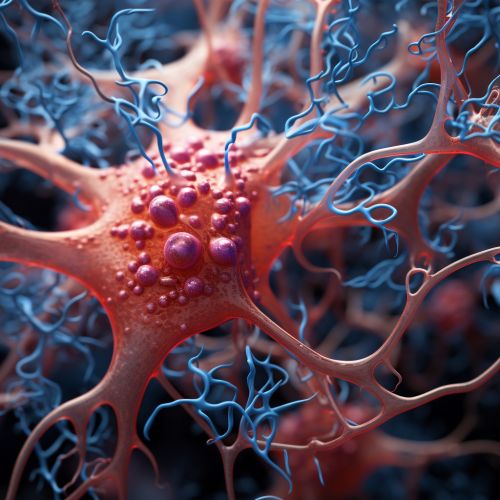Mitochondrial Dysfunction in Neurodegenerative Diseases
Introduction
Mitochondrial dysfunction is a pathological condition that is associated with a range of human diseases, including neurodegenerative diseases. The mitochondria, often referred to as the powerhouses of the cell, are responsible for the production of energy in the form of adenosine triphosphate (ATP). In neurodegenerative diseases, there is often a marked decrease in the efficiency of this energy production, leading to a state of energy deficiency within the neuron. This article will explore the role of mitochondrial dysfunction in neurodegenerative diseases, with a focus on the molecular mechanisms involved and the potential therapeutic strategies that are being developed to combat this issue.


Mitochondrial Dysfunction and Neurodegenerative Diseases
Neurodegenerative diseases are a group of disorders characterized by the progressive loss of structure or function of neurons, including death of neurons. Many neurodegenerative diseases including Parkinson's, Alzheimer's, and Huntington's are caused by genetic mutations, most of which are associated with mitochondrial dysfunction.
Mitochondrial Dysfunction in Parkinson's Disease
Parkinson's disease is a neurodegenerative disorder characterized by the progressive loss of dopaminergic neurons in the substantia nigra pars compacta. One of the key pathological features of Parkinson's disease is the presence of Lewy bodies, which are intracellular inclusions composed of aggregates of the protein alpha-synuclein. Mitochondrial dysfunction has been implicated in the pathogenesis of Parkinson's disease, with evidence suggesting that alpha-synuclein can impair mitochondrial function.
Mitochondrial Dysfunction in Alzheimer's Disease
Alzheimer's disease is a neurodegenerative disorder characterized by the progressive loss of neurons in the cerebral cortex and hippocampus. The pathological hallmarks of Alzheimer's disease are the presence of extracellular amyloid-beta plaques and intracellular neurofibrillary tangles composed of hyperphosphorylated tau protein. Mitochondrial dysfunction has been implicated in the pathogenesis of Alzheimer's disease, with evidence suggesting that amyloid-beta and tau can impair mitochondrial function.
Mitochondrial Dysfunction in Huntington's Disease
Huntington's disease is a neurodegenerative disorder characterized by the progressive loss of neurons in the striatum and cerebral cortex. The pathological hallmark of Huntington's disease is the presence of intracellular inclusions composed of aggregates of the protein huntingtin. Mitochondrial dysfunction has been implicated in the pathogenesis of Huntington's disease, with evidence suggesting that mutant huntingtin can impair mitochondrial function.
Molecular Mechanisms of Mitochondrial Dysfunction in Neurodegenerative Diseases
Mitochondrial dysfunction in neurodegenerative diseases can occur through a variety of mechanisms, including impaired energy production, increased production of reactive oxygen species, impaired calcium handling, and activation of cell death pathways.
Impaired Energy Production
The primary function of the mitochondria is to produce ATP through the process of oxidative phosphorylation. In neurodegenerative diseases, there is often a decrease in the efficiency of oxidative phosphorylation, leading to a state of energy deficiency within the neuron. This can impair the function of energy-dependent processes, such as the maintenance of ion gradients and the synthesis of neurotransmitters, which can contribute to neuronal dysfunction and death.
Increased Production of Reactive Oxygen Species
The mitochondria are a major source of reactive oxygen species (ROS), which are a type of free radical that can cause damage to cellular components, including DNA, proteins, and lipids. In neurodegenerative diseases, there is often an increase in the production of ROS, which can contribute to oxidative stress and neuronal damage.
Impaired Calcium Handling
The mitochondria play a key role in the regulation of intracellular calcium levels. In neurodegenerative diseases, there is often an impairment in mitochondrial calcium handling, which can lead to an increase in intracellular calcium levels. This can activate calcium-dependent enzymes, such as calpains and phospholipases, which can cause damage to cellular components and contribute to neuronal death.
Activation of Cell Death Pathways
The mitochondria are involved in the regulation of cell death pathways, including apoptosis and necrosis. In neurodegenerative diseases, there is often an activation of these cell death pathways, which can contribute to neuronal death.
Therapeutic Strategies for Mitochondrial Dysfunction in Neurodegenerative Diseases
Given the role of mitochondrial dysfunction in neurodegenerative diseases, there is considerable interest in developing therapeutic strategies that can improve mitochondrial function. These strategies include the use of antioxidants, mitochondrial-targeted therapies, and gene therapies.
Antioxidants
Antioxidants are substances that can neutralize ROS, thereby reducing oxidative stress and neuronal damage. Several antioxidants, including coenzyme Q10 and vitamin E, have been investigated for their potential to improve mitochondrial function in neurodegenerative diseases.
Mitochondrial-Targeted Therapies
Mitochondrial-targeted therapies are designed to improve mitochondrial function by targeting specific aspects of mitochondrial biology. These therapies include the use of small molecules that can enhance oxidative phosphorylation, reduce the production of ROS, or improve mitochondrial calcium handling.
Gene Therapies
Gene therapies are designed to correct the genetic defects that cause mitochondrial dysfunction in neurodegenerative diseases. These therapies involve the use of viral vectors to deliver healthy copies of the defective genes to the neurons.
Conclusion
Mitochondrial dysfunction is a key pathological feature of many neurodegenerative diseases, and understanding the molecular mechanisms involved is crucial for the development of effective therapeutic strategies. While considerable progress has been made in this area, further research is needed to fully elucidate the role of mitochondrial dysfunction in neurodegenerative diseases and to develop therapies that can effectively target this issue.
